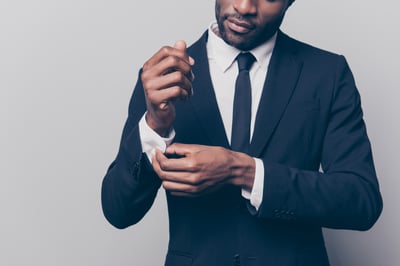November 10, 2025
 by Harshita Tewari / November 10, 2025
by Harshita Tewari / November 10, 2025

After a job interview, most candidates focus on waiting for an update, a call, or even closure. But one small step can make a big difference in how you’re remembered: sending a thank-you letter after an interview.
It’s not about flattery or formality. A thank-you note is a chance to stand out in a crowded candidate pool. It shows you’re thoughtful, proactive, and genuinely interested, qualities every employer wants in a hire.
Thank the interviewer for their time, express enthusiasm for the role, reference a specific topic discussed during the interview, and reaffirm your suitability for the position. Example: "Thank you for the opportunity to speak with you today. I’m excited about the role and confident my experience aligns with your team’s goals."
Amid the constant hustle of interviews, spending time on a thank-you letter might seem a waste. It's not. AI writing tools can help you draft quickly, but keep it grounded in what you actually discussed and always personalize the details.
While many candidates skip this step, assuming the interview spoke for itself, a well-crafted thank-you message shows a level of reflection, professionalism, and communication maturity that resumes and interviews alone can’t always convey.
Here’s what a thank-you email actually accomplishes:
Before you start typing, it’s worth pausing to reflect on the interview and make intentional decisions about your message. Here’s what to think through first:
Before you begin writing, take a moment to mentally rewind the interview. What questions did the interviewer ask that caught your attention? Did they mention challenges the team is facing, or give you insights into the company culture?
Equally important: Were there moments when you felt unclear or rushed? Maybe you missed the chance to share something important. Make a note of anything you wish you’d said or emphasized more clearly. These small details can become powerful additions in your follow-up.
If you interviewed with multiple people, you’ll want to send individual thank-you messages, not a single group email. Each person likely played a different role in the process and may value different qualities in a candidate.
Tailor each message just slightly. Reference something unique from your conversation with that individual, whether it was a technical question they asked or a project they described. Even subtle changes show that you paid attention and that you care about more than just checking a box.
Email is the default for post-interview thank-you notes, and with good reason. It’s immediate, easy to personalize, and ensures your message arrives when the conversation is still fresh. If you’re managing multiple follow-ups or want to stay organized, explore the best email management software on G2 to streamline your process and stay on top of your job hunt.
Handwritten notes can be thoughtful in certain industries (like publishing, education, or design), but they’re slow. If you send one, do so as a follow-up to your email, not as a replacement for it. And make sure it’s professional: no sticky notes, decorative stationery, or overly casual phrasing.
When in doubt, go digital first. Most interviewers expect email, and it's the safest, most practical option.
A thank-you note is not the place for marketing jargon or inflated achievements. Over-the-top lines like “I singlehandedly doubled company revenue” tend to fall flat, or worse, feel insincere.
Your tone should be respectful, conversational, and appreciative. You're not reapplying for the job; you're thanking someone for their time and reiterating your interest in joining their team. Focus on what was discussed, why it resonated with you, and what you're excited about next. If you stay authentic, you'll strike the right balance between confidence and humility.
While every thank-you note should reflect your voice and the company's tone, there’s a proven structure that works. Think of your message as a professional follow-up, not a cover letter, not a resume recap, and definitely not a desperate plea.
Here’s a simple breakdown of what to include and why each part matters.
If you're sending your thank-you via email (which you should), the subject line is the first impression. Keep it simple and relevant. Your goal is clarity, not creativity. Avoid subject lines like “Following up!” or “Thanks again!!!” which feel vague or overly casual. You want the reader to instantly recognize who it is from and what it’s about.
Examples:
Use sentence case, avoid emojis or gimmicks, and keep it under 60 characters when possible.
Start your message with a correct, respectful salutation, ideally using the recipient’s title and last name. If your interview was casual or the interviewer signed off using their first name, it’s fine to adopt a similar tone. When in doubt, err on the side of formality.
Examples:
Ensure names are spelled correctly, triple-check if necessary.
The first paragraph should do two things: thank the interviewer and remind them which position you applied for. This is particularly important if they spoke to multiple candidates (or for multiple roles) on the same day.
Keep this section sincere but efficient. You’re not writing a novel, just acknowledging their time and effort.
Example:
Thank you for taking the time to speak with me yesterday about the [Job Title] position. I really appreciated learning more about the team’s work and your insights on [Company Name]’s current goals.
Avoid filler phrases like “It was such an honor” or “I was humbled to be in your presence.” Keep your tone professional and grounded.
In the second paragraph, talk about a question that stood out, a challenge they mentioned, or a value they emphasized. This reinforces that you were actively engaged and helps differentiate your message from generic thank-you notes.
Example:
Our discussion about your upcoming product launch stuck with me, particularly your focus on refining customer feedback loops. It’s exactly the kind of work I’d be excited to contribute to, given my experience leading [related project or initiative].
This section is where you subtly tie their needs to your strengths. Don’t rehash your resume; instead, reinforce alignment.
Interviews aren’t perfect, and it’s possible you forgot to mention something that could really help make your case for being the best choice. The thank you letter can be a redeeming moment wherein you bring up that experience or skill that slipped your mind.
Again, don’t take too long to do this. You want to respect your interviewer’s time and understand they have their own work to do. But you also want your best foot out there, and it’s okay to dedicate some of your thank you letter to communicating some forgotten talents.
Example:
In our conversation, I didn’t get the chance to mention a recent project where I led a cross-functional team to improve onboarding by 30%. It’s a good example of how I approach collaboration and process improvement, areas I know are important in this role.
Keep this paragraph brief. You’re not adding a whole new pitch, just a thoughtful footnote that adds clarity or depth.
Wrap up your note by reaffirming your appreciation and interest in the matter. Use warm, professional language that makes it easy for the interviewer to follow up or keep you in mind.
Example:
Thanks again for your time and the great conversation. I’m excited about the opportunity to join [Company Name] and would welcome the chance to contribute to the team. Please don’t hesitate to reach out if I can provide any further information.
Use a formal but friendly sign-off like:
Then, include your full name, and optionally, your phone number or LinkedIn profile, if it wasn’t already included in the email header.
Even short thank-you emails can go wrong if you're not careful. Before you hit send, avoid these pitfalls:
Now that you know what a strong thank-you email should include, here are ready-to-use templates for different scenarios.
Use this when following up after a standard one-on-one interview for any role.
Dear [Interviewer’s Name],
Thank you for taking the time to speak with me yesterday about the [Job Title] position at [Company Name]. I appreciated the opportunity to learn more about the team and your approach to [specific aspect discussed, e.g., onboarding, customer feedback, product development].
Our conversation reaffirmed my interest in the role and made me even more enthusiastic about the potential to contribute. I believe my background in [brief relevant skill or experience] aligns well with your goals for the position.
Please don’t hesitate to reach out if you need anything else from me. I’m excited about what’s ahead and appreciate your consideration.
Best regards,
[Your Full Name]
[Phone Number or LinkedIn]
Use this format when you’ve interviewed with multiple people and want to send a personalized message to each.
Hi [Interviewer's First Name],
Thank you for the great conversation during our panel interview for the [Job Title] role. I enjoyed hearing your perspective on [specific topic or challenge they mentioned], and it gave me helpful insight into how [Company Name] operates across teams.
The work your team is doing on [relevant project or topic] really stood out to me, and I’d be excited to support that kind of initiative.
Thanks again for your time and thoughtful questions. I hope to have the chance to work with you in the future.
Best,
[Your Name]
Choose this version if you forgot to mention a key skill or project during the interview and want to briefly include it.
Dear [Interviewer’s Name],
Thank you for our conversation on [Day] about the [Job Title] role. I appreciated your insights into [team, goals, or process] and left feeling even more aligned with the opportunity.
After our conversation, I realized I hadn’t mentioned a relevant experience that might provide helpful context. At [Previous Company], I led [brief description of project], which taught me a lot about [relevant skill or outcome tied to the new role].
Thanks again for your time and consideration. I look forward to staying in touch.
Warm regards,
[Your Full Name]
This version works well for closing out a longer interview process or expressing gratitude after a final conversation.
Hi [Interviewer’s Name],
Thank you for taking the time to meet with me again and for guiding me through the interview process for the [Job Title] role. It’s been a pleasure connecting with the team, and I genuinely appreciate the opportunity to learn more about [Company Name] and the exciting direction you're headed.
I’m particularly drawn to [key topic or initiative discussed], and I’m confident that my background in [skill or area] would allow me to make meaningful contributions.
Regardless of the outcome, I’m grateful for the time and thought you’ve put into this process. Thank you again.
Sincerely,
[Your Name]
Below are some more role-based templates you can explore to create your own thank you letter.
So you interviewed for a sales position. This means your interviewer might expect some words from you after the interview. A salesperson is outspoken and confident. Let your words reflect the energy and zeal you might have showcased during the interview.
Dear Ms. Randolph,
Thank you for taking the time to speak with me about the sales role yesterday. I enjoyed learning more about how your team approaches relationship-building and long-term customer growth.
Our conversation about consultative selling and pipeline ownership really stood out to me. It aligns well with how I’ve approached sales in previous roles, especially when working with complex customer needs.
I appreciate the opportunity to connect and would be excited to bring that same focus and energy to your team. Please feel free to reach out if you need anything further.
Best regards,
Name
They don't expect you to manage their product if you can't even write a simple thank-you email. Product marketers are skilled in effective communication and linguistic abilities. And what better way to prove it than scribbling thank you notes in a stylish tone?
Dear Ms. Randolph,
Thank you for the thoughtful conversation about the Product Marketing Specialist role. I appreciated learning more about how your team approaches go-to-market strategy and cross-functional collaboration.
Our discussion around positioning and customer messaging particularly resonated with me. It reinforced my interest in the role and how my experience supporting launches and campaigns could add value to the team.
Thanks again for your time and insights. I’d be glad to provide any additional information if helpful.
Best regards,
Name
Before setting a future in software coding, click your pen first. Software engineer interviews can be tricky to decode, as they require a candidate to possess a mix of technical and soft communication skills. Show your potential interviewers that, besides Java and C++, you can also excel in writing.
Dear Ms. Randolph,
Thank you for walking me through the interview process and for the opportunity to discuss the Software Engineer role. I appreciated learning more about the team’s technical approach and development priorities.
Our conversation around system design and collaboration across teams stood out to me. It gave me a clearer picture of how engineers contribute beyond writing code, which is something I value highly.
Thank you again for your time and consideration. I look forward to staying in touch.
Best Regards,
Name
Got more questions? We have the answers.
Yes, especially if you’re serious about the role. Whether it’s a phone screen, panel interview, or final round, a thank-you note shows you’re engaged and professional. It doesn’t have to be lengthy; even a short message makes a difference.
It’s better to send a late thank-you than none at all. Acknowledge the delay briefly and keep the message focused, appreciative, and relevant.
Yes. If you met with multiple people, send individual notes. Personalize each one, even if just a few lines, based on your conversation. Avoid copying and pasting the same message to everyone on the panel.
No. Avoid asking about compensation or timelines in your thank-you note. Keep the focus on appreciation, interest in the role, and a brief reinforcement of your fit. Follow-up questions about the process or feedback can be sent later, if needed.
Yes. AI writing assistants can help you get started if you're unsure how to structure your message or find the right tone. However, it’s important to personalize the content. AI can generate a strong first draft, but ensure the final version accurately reflects your actual conversation, voice, and intent.
In a hiring process where small details often tip the scale, a well-timed and well-written message can be the difference between getting a second look and being passed over. Whether it’s a quick follow-up or a more detailed note, the effort signals that you’re thoughtful, engaged, and serious about the role.
Take the time. Write it well. And remember, how you follow up is often how you’re remembered.
Want to make an even stronger impression in your next interview? Check out the best questions to ask your interviewer.
This article was originally published in 2023. It has been updated with new information.
Harshita is a Content Marketing Specialist at G2. She holds a Master’s degree in Biotechnology and has worked in the sales and marketing sector for food tech and travel startups. Currently, she specializes in writing content for the ERP persona, covering topics like energy management, IP management, process ERP, and vendor management. In her free time, she can be found snuggled up with her pets, writing poetry, or in the middle of a Netflix binge.
It’s safe to say that many of us are familiar with the Boy Scouts' motto: Always be prepared.
 by Derek Doeing
by Derek Doeing
At 18, I interviewed for a job at a local produce store. Three people, including the owner,...
 by Derek Doeing
by Derek Doeing
I didn’t know it at the time, but my job had been slowly burning me out.
 by Harshita Tewari
by Harshita Tewari
It’s safe to say that many of us are familiar with the Boy Scouts' motto: Always be prepared.
 by Derek Doeing
by Derek Doeing
At 18, I interviewed for a job at a local produce store. Three people, including the owner,...
 by Derek Doeing
by Derek Doeing


